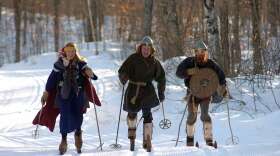Life has moved along a bit since the 1980s, but certain concepts from that time still remain fresh. In 1989, urban sociologist Ray Oldenburg wrote The Great, Good Place. The book highlights local spots that are not considered work or home, but somewhere to informally gather and socialize. Cafes, coffee shops, bookstores, bars and barbershops are all considered "third places" where community, civic engagement and civil discourse is encouraged.
Oldenburg, now professor emeritus at the University of West Florida in Pensacola, explains that he got interested in a place-driven urban sociology as a rebellion to the school of sociology teachings of "symbolic interactionism." He says that symbolic interactionism is the idea that reality is what we agree upon.

Oldenburg couldn't wrap his head around this. "There's a hard physical world out there, and it dictates things we can do and things we can't do," he counters. "I just jumped ship [from symbolic interactionism] and got into [third places]."
Oldenburg was also spurred on by the deficiencies of the modern suburb. "I just couldn't believe this kind of place was desirable. For instance, there is in all [suburban houses] a large, useless and expensive front lawn," he laughs. "There is no place to get together on the corner. Every place on the corner now is a private residence."
Ironically, he moved to suburban life in Pensacola for his teaching position, shuttling back and forth between home and work, ne'er anywhere else. Luckily, a third place was in sight.
"One day, I happened to be driving by the same bakery, Krell's Bakery, and it had four or five picture windows," he details. "I saw the same people in there every morning. So I decided to stop. By the third visit, I was a regular there. I knew all the guys, and they all knew me. It just made life bearable. That was my introduction to the real third place."
Regulars at the bakery would help each other by fixing a car or sawing down a tree at a neighbor's house, Oldenburg recalls. "We were doing things for one another, helpful things. When I started stopping at Krell's, I'll tell you honestly, I never had a bad day after that."
Places like Krell's (which doesn't exist anymore) countered the complacency of the post-industrial life. "In the typical modern suburb, there are no such places," he says. "The overdone emphasis on American individualism [fuels this]. People do not get together."
Oldenburg suspects that the economy is the driving factor for city and suburban layouts. "The American economy depends on people spending money for things that we don't need but are conditioned to want."
"We've become extremely reliant on television because we live such isolated lives," he continues. "If people have these places and regularly get together with their friends and are enjoying life, the need to consume [TV], the need to shop, just isn't there anymore."
Oldenburg suggests that finding one's own third place is a step in the right direction towards happiness. "You have to have a certain attitude about time. I've had older guys tell me, 'I used to think you guys sitting there laughing with one another and sipping your coffee, I used to think you were wasting time'...If you have that attitude that every time you sit at a coffee counter then that's an impediment," he says.
Oldenburg is currently writing his fourth book, The Joy of Tippling. He says that this book may be more controversial than his prior three, because he is "promoting the habitual use of a moderate amount of alcohol. Why? Because it brings people together."






